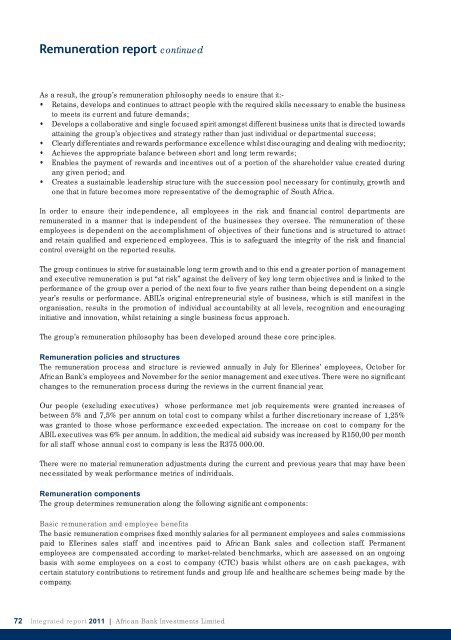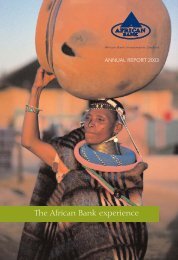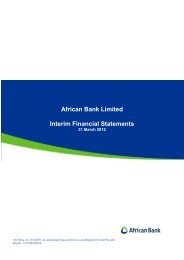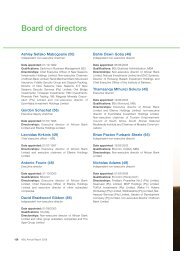Full integrated annual report - African Bank - Investoreports
Full integrated annual report - African Bank - Investoreports
Full integrated annual report - African Bank - Investoreports
Create successful ePaper yourself
Turn your PDF publications into a flip-book with our unique Google optimized e-Paper software.
72<br />
Remuneration <strong>report</strong> continued<br />
As a result, the group’s remuneration philosophy needs to ensure that it:-<br />
Retains, develops and continues to attract people with the required skills necessary to enable the business<br />
to meets its current and future demands;<br />
Develops a collaborative and single focused spirit amongst different business units that is directed towards<br />
attaining the group’s objectives and strategy rather than just individual or departmental success;<br />
Clearly differentiates and rewards performance excellence whilst discouraging and dealing with mediocrity;<br />
Achieves the appropriate balance between short and long term rewards;<br />
Enables the payment of rewards and incentives out of a portion of the shareholder value created during<br />
any given period; and<br />
Creates a sustainable leadership structure with the succession pool necessary for continuity, growth and<br />
one that in future becomes more representative of the demographic of South Africa.<br />
In order to ensure their independence, all employees in the risk and fi nancial control departments are<br />
remunerated in a manner that is independent of the businesses they oversee. The remuneration of these<br />
employees is dependent on the accomplishment of objectives of their functions and is structured to attract<br />
and retain qualifi ed and experienced employees. This is to safeguard the integrity of the risk and fi nancial<br />
control oversight on the <strong>report</strong>ed results.<br />
The group continues to strive for sustainable long term growth and to this end a greater portion of management<br />
and executive remuneration is put “at risk” against the delivery of key long term objectives and is linked to the<br />
performance of the group over a period of the next four to fi ve years rather than being dependent on a single<br />
year’s results or performance. ABIL’s original entrepreneurial style of business, which is still manifest in the<br />
organisation, results in the promotion of individual accountability at all levels, recognition and encouraging<br />
initiative and innovation, whilst retaining a single business focus approach.<br />
The group’s remuneration philosophy has been developed around these core principles.<br />
Remuneration policies and structures<br />
The remuneration process and structure is reviewed <strong>annual</strong>ly in July for Ellerines’ employees, October for<br />
<strong>African</strong> <strong>Bank</strong>’s employees and November for the senior management and executives. There were no signifi cant<br />
changes to the remuneration process during the reviews in the current fi nancial year.<br />
Our people (excluding executives) whose performance met job requirements were granted increases of<br />
between 5% and 7,5% per annum on total cost to company whilst a further discretionary increase of 1,25%<br />
was granted to those whose performance exceeded expectation. The increase on cost to company for the<br />
ABIL executives was 6% per annum. In addition, the medical aid subsidy was increased by R150,00 per month<br />
for all staff whose <strong>annual</strong> cost to company is less the R375 000.00.<br />
There were no material remuneration adjustments during the current and previous years that may have been<br />
necessitated by weak performance metrics of individuals.<br />
Remuneration components<br />
The group determines remuneration along the following signifi cant components:<br />
Basic remuneration and employee benefits<br />
The basic remuneration comprises fi xed monthly salaries for all permanent employees and sales commissions<br />
paid to Ellerines sales staff and incentives paid to <strong>African</strong> <strong>Bank</strong> sales and collection staff. Permanent<br />
employees are compensated according to market-related benchmarks, which are assessed on an ongoing<br />
basis with some employees on a cost to company (CTC) basis whilst others are on cash packages, with<br />
certain statutory contributions to retirement funds and group life and healthcare schemes being made by the<br />
company.<br />
Integrated <strong>report</strong> 2011 | <strong>African</strong> <strong>Bank</strong> Investments Limited







